Key Takeaways:
- Most surgeons recommend waiting one to two weeks after bariatric surgery before driving again.
- You should never drive while taking narcotic pain medications, as they significantly impair your reaction time and judgment.
- Your readiness to drive depends on your pain levels, mobility, and energy. If you can’t comfortably turn to check blind spots or react quickly in an emergency, wait longer.
As you plan your post bariatric surgery from bariatric surgery, you’re probably wondering about getting back to your normal activities, including driving. The answer isn’t the same for everyone.
Let’s talk about what most surgeons recommend and what factors might affect your personal timeline for getting back behind the wheel.
Table of Contents
General Guidelines for Driving After Bariatric Surgery
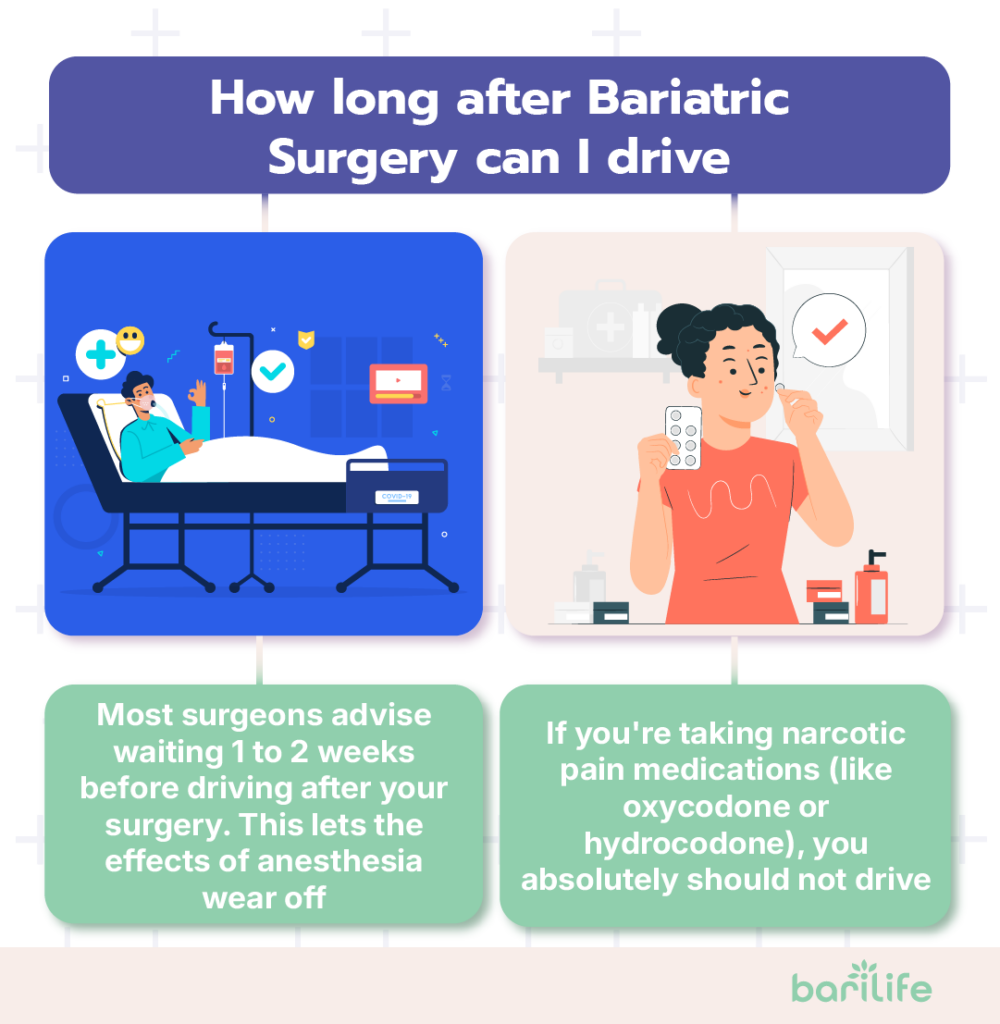
Here are some general guidelines on when you can get back to driving after bariatric surgery.
Recovery Timeline
Most surgeons advise waiting 1 to 2 weeks before driving after your surgery. This lets the effects of anesthesia completely wear off. It also allows you to get used to your new eating patterns and energy levels before tackling driving.
During this time, your body is working hard to heal internal incisions and adjust to the changes from surgery. You might feel more tired than usual or have some discomfort that could make driving unsafe. This period is a key part of your overall bariatric surgery recovery time.
Medication Considerations
If you’re taking narcotic pain medications (like oxycodone or hydrocodone), you absolutely should not drive. In fact, it’s illegal. These medications significantly affect your reaction time, judgment, and coordination, similar to how alcohol affects driving ability.
Many patients transition to over-the-counter pain relievers like acetaminophen (Tylenol) after the first few days. Once you’re managing your discomfort with non-narcotic medications, you’re one step closer to being ready to drive.
Individual Assessment
Everyone’s recovery journey is unique. Some people bounce back quickly after the operation, while others need more time. Getting back behind the wheel depends partly on how you personally feel during recovery.
Ask yourself these questions when considering if you’re ready:
- Can I move comfortably without pain that distracts me?
- Do I have enough energy to focus for the entire drive?
- Can I turn my body easily to check blind spots?
- Could I react quickly in an emergency situation?
If you’re unsure about any of these questions, it’s probably best to wait a bit longer or get your doctor’s specific advice.
Medical Guidelines for Resuming Driving
Here are some medical guidelines for when you can resume driving.
Surgeon’s Recommendations
Your surgical team knows your specific situation best, so their advice about when you can drive after bariatric surgery should be your primary guide. Surgeons base their guidelines on years of experience.
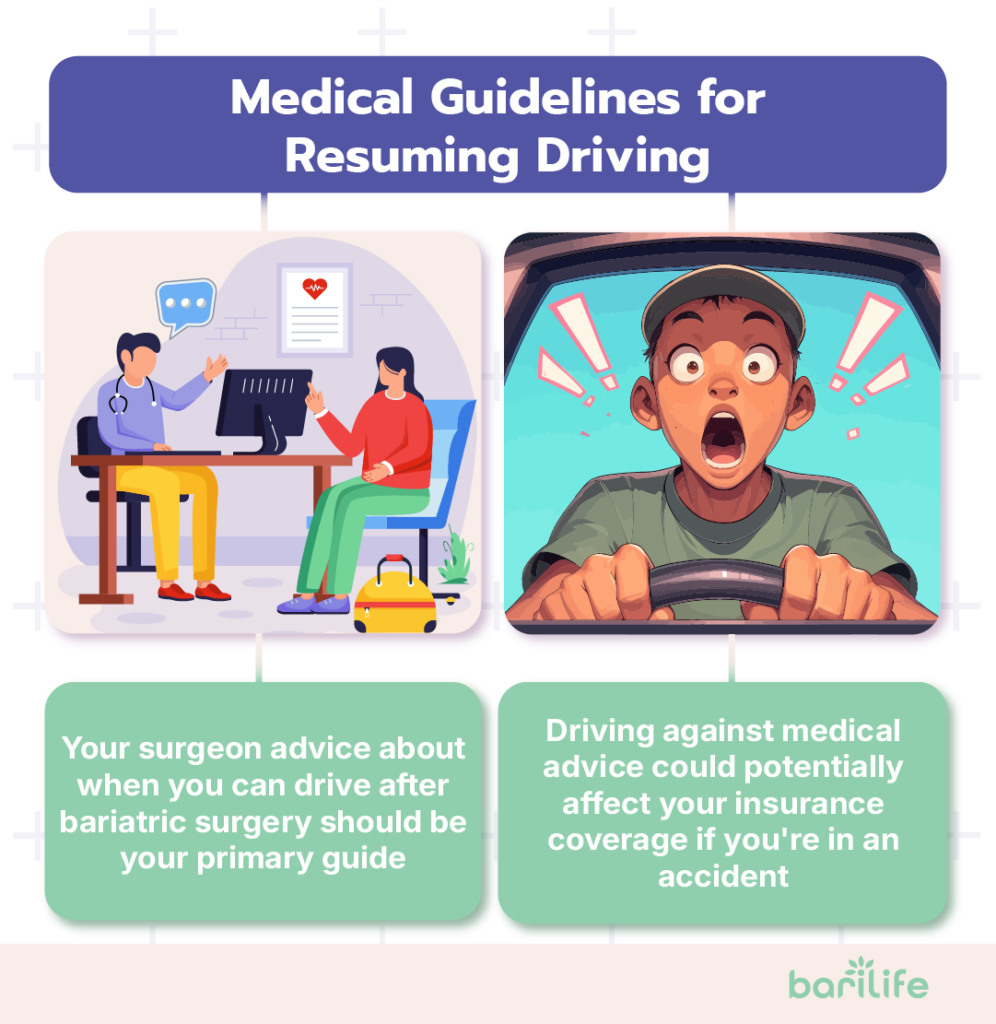
Postoperative Follow-Up
Your follow-up appointments are perfect opportunities to discuss resuming activities like driving. Even if you feel ready to drive before your first follow-up appointment (which is typically one to two weeks after surgery), it’s still a good idea to get official clearance from your medical team.
Legal and Insurance Considerations
This is something many patients don’t think about: driving against medical advice could potentially affect your insurance coverage if you’re in an accident. Some insurance policies might have exclusions related to operating vehicles contrary to a doctor’s instructions.
While you don’t necessarily need to inform your auto insurance company about your surgery, you should follow your doctor’s advice about when it’s safe to drive.
Physical Readiness to Drive
Here are some guidelines to follow for when you might be physically ready to drive.
Pain Management
Before getting back behind the wheel, make sure your post-surgery pain is well-controlled without strong medications. If you’re still experiencing significant discomfort, it can distract you while driving and slow your reaction time.
How long after bariatric surgery you can drive partly depends on when you can sit comfortably in a driving position without pain that distracts you from focusing on the road.
Mobility and Reflexes
Driving requires a surprising amount of physical mobility. You need to be able to press the pedals comfortably, turn the steering wheel fully, twist to look behind you when backing up, and react quickly if something unexpected happens.
Before driving, try sitting in your parked car and going through the motions of driving to assess your comfort and mobility. You’ll have a better answer after this simple test.
Endurance
Even if pain isn’t an issue, your energy levels might be lower than usual after surgery. Fatigue can impair your driving ability almost as much as alcohol or medications can.
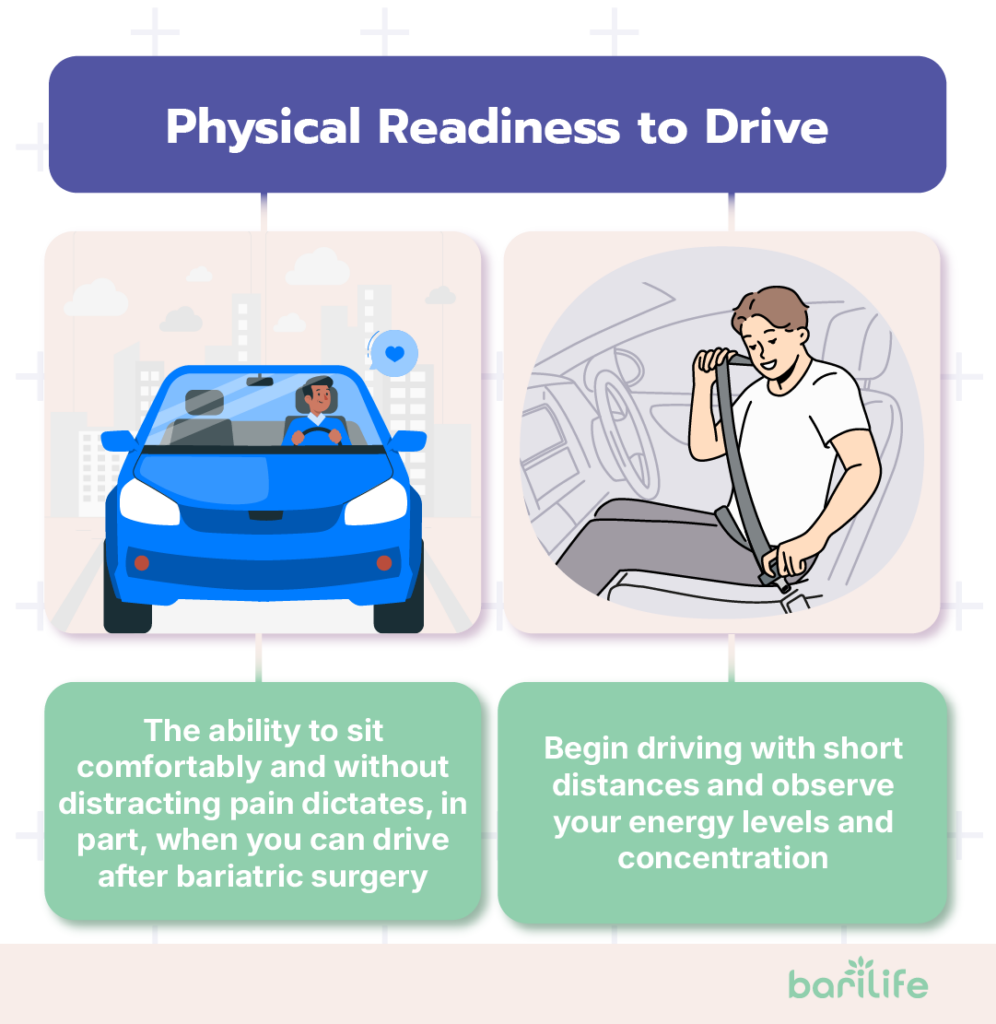
When you first return to driving, start with short trips; pay attention to how quickly you tire and whether your concentration remains sharp throughout the drive.
Doctor’s Clearance and Medical Advice
It’s most important to wait for your doctor to clear you to drive.
Professional Evaluation
Getting an official clearance from your doctor before resuming driving provides peace of mind that you’re not risking your recovery or safety.
During your evaluation, be honest about any symptoms you’re experiencing, such as pain, fatigue, or dizziness. These details help your doctor make an accurate assessment.
Customized Recommendations
Your doctor’s advice about how soon after bariatric surgery you can drive might differ from general guidelines based on your specific circumstances. Factors that might require a longer waiting period include complications during or after surgery, pre-existing health conditions, your age, and the physical demands of your typical driving.
Special Considerations for Different Types of Bariatric Surgery
Here are some special considerations based on the type of bariatric surgery you have.
Surgical Procedure Impact
The type of bariatric procedure you’ve had can influence how quickly you’re ready to drive:
- Laparoscopic procedures (with small incisions) typically allow for a quicker return to driving than open surgeries.
- Less complex procedures like gastric banding might have shorter restrictions than more extensive surgeries like gastric bypass.
- Revisional surgeries might require a longer recovery before driving.
When you can drive after bariatric surgery depends partly on these surgical factors, which is another reason to follow your surgeon’s advice.
Complication Factors
If you experienced any complications during or after surgery, your driving timeline might be longer. Complications might include excessive bleeding, infection, leakage from surgical connections, severe nausea, or unusual pain.
These issues can prolong your recovery and delay when it’s safe to drive. Always follow your healthcare team’s guidance if complications occur.
Practical Tips for Returning to Driving
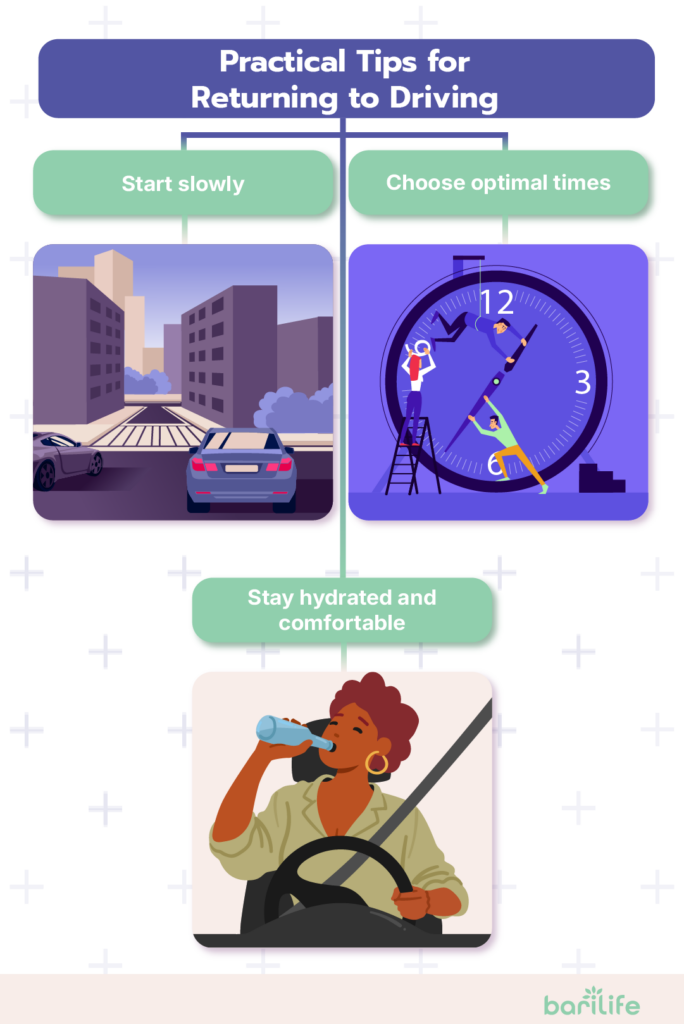
Follow these practical tips when getting behind the wheel after bariatric surgery.
- Start slowly: When you do get back behind the wheel, ease into it gradually. Your first trip shouldn’t be a long commute in rush-hour traffic or a lengthy road trip.Having someone ride with you the first few times is also a good idea in case you need assistance.
- Choose optimal times: Consider avoiding rush hour traffic when possible, driving during daylight hours when visibility is better, and choosing good weather days instead of driving in rain or snow.
- Stay hydrated and comfortable: Try wearing your seat belt in a position that doesn’t press directly on your incisions, bringing water to stay hydrated, and wearing loose, comfortable clothing that doesn’t restrict movement.
Conclusion
When you can drive after bariatric surgery really comes down to your individual recovery process, your surgeon’s specific guidelines, and your own comfort level.
By following medical advice, listening to your body, and taking a gradual approach to resuming driving, you’ll be back on the road safely when the time is right.
How Bari Life Can Help
Maintaining proper nutrition during your recovery period is crucial for healing and regaining the energy you need to resume activities like driving. Bari Life’s specialized bariatric vitamins are formulated to support your body’s increased nutritional needs during this important recovery phase.
Whether you’re just beginning your post-surgery journey or well into your recovery, Bari Life offers a comprehensive range of bariatric supplements tailored to your needs. Our bariatric multivitamins, including options like bariatric multivitamin with iron, ensure you’re getting the essential nutrients your body requires. We also provide bariatric vitamins chewable for those who have difficulty swallowing pills, as well as liquid bariatric vitamin alternatives.
To further support healing and energy levels, our bariatric protein shakes and bariatric protein bars deliver high-quality protein that’s easy to digest and absorb. These protein-rich options are designed to promote tissue repair and sustained energy—key elements during recovery.
If you’re looking to maintain a balanced and satisfying diet, our variety of bariatric snacks are a great way to stay on track without compromising taste or nutrition. For bone health, bariatric calcium chews provide the calcium you need in a convenient and tasty form.
We also understand that post-surgery changes can affect more than just your weight—many experience shifts in digestion and hair health. That’s why Bari Life includes products like our bariatric probiotic to support gut health and bariatric vitamins for hair loss to help maintain healthy hair growth.
Visit Bari Life today to ensure you have the nutritional support necessary for a smooth recovery and a successful transition back to your normal activities, including driving.
If you want to learn more, why not check out these articles below:
- Why Are You Not Allowed To Use a Straw After Bariatric Surgery?
- How Long After Bariatric Surgery Can You Have Sex?
- How Long After Bariatric Surgery Can I Go Back To Work?
- How Long After Bariatric Surgery Can You Swim?
- Vaping After Bariatric Surgery
Resources
Drug-Impaired Driving. (n.d.) National Highway Traffic Safety Administration.

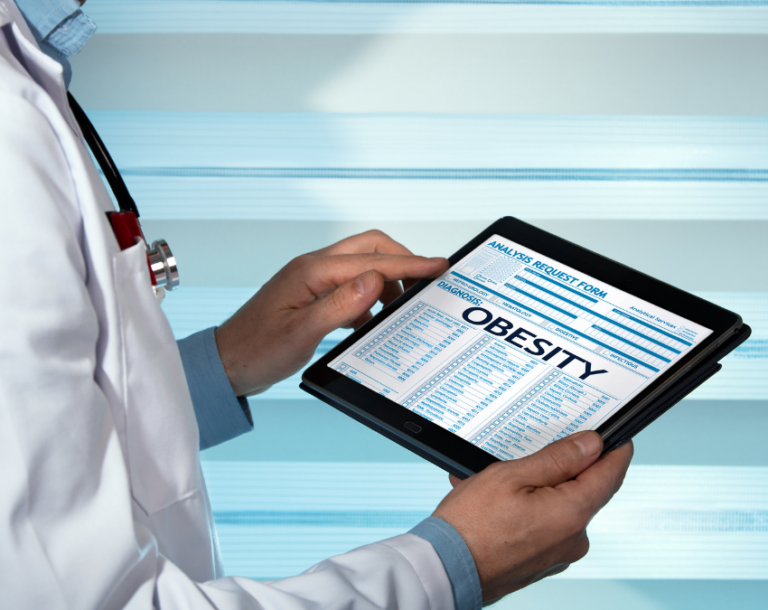

What are your tips and tricks to post-bariatric success?